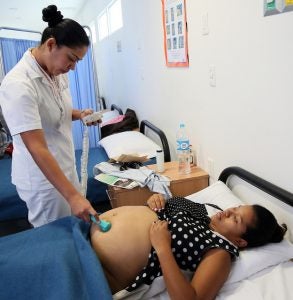A new commentary, Sexual and Reproductive Health and Rights in the Time of Zika in Latin America and the Caribbean, published in this month’s issue of Studies in Family Planning, explores the current and future implications of the virus in the world’s most affected regions. The article, co-authored by Ana Langer, Director of the Maternal Health Task Force (MHTF), Jacquelyn Caglia, Associate Director, and Clara Menéndez, Director of the Maternal, Child and Reproductive Health Initiative at the Barcelona Institute for Global Health, presents the Zika outbreak as a pivotal period that could either magnify the immense burden faced by many women, families, and children in these regions or serve as an opportunity to demand stronger health systems that deliver comprehensive sexual and reproductive health care.
Now affecting over a million people in 20 countries, the Zika epidemic in the Latin America and Caribbean region (LAC) has engendered a complex scenario that must go beyond addressing prevention, diagnosis, and treatment. Due to the virus’ potential effects on newborns and developing fetuses, ranging from microcephaly to other congenital neurological abnormalities, sexual and reproductive health and rights are inseparable elements of the Zika response.
However, according to the commentary, government responses to Zika, including recommendations for women to abstain from sex and delay pregnancy in the immediate future, put the onus on women to prevent the spread of the virus, fail to address the root causes, and “issue a devastating blow to women’s reproductive rights.” The authors argue that these unrealistic guidelines ignore the context of the current outbreak—in which women often lack sexual autonomy due to high rates of sexual assault, intimate partner violence, and non-consensual sex—as well as the setting—a region with highly restrictive access to contraception and safe and legal abortion.
Policies and Actions Needed to Mitigate Zika’s Impact
The authors identify three proactive measures to control the virus and diminish its devastating effects on women, children, and families. According to Langer, Caglia, and Menéndez, the affected population in LAC need the following:
- Guaranteed rights to sexual and reproductive health, including access to a full range of contraceptive methods and reproductive options
- Access to accurate information about the transmission and prevention of the virus
- Efforts to promote vector control, including long-term solutions for improved water and sanitation systems
To expedite and improve the Zika response, the authors call for strengthened partnerships with governments, research institutions, the private sector, and civil society groups, including faith-based organizations, stressing the importance of increasing financial resources to fund research, diagnosis, treatment, and prevention efforts.
The authors implore a multipronged Zika response that addresses the current situation and sets forth lasting structural improvements:
“We must harness this moment of heightened attention in the region to support LAC in a response that simultaneously responds to Zika virus; improves health systems so they are able to offer quality integrated care to girls, women, and children; and strengthens sexual and reproductive health policies, programs, and services and guarantees rights for all.”
—
Access the commentary from Studies in Family Planning here.
Read more on Zika in the context of maternal, sexual, and reproductive health and rights.
Photo: “Lila Downs and PAHO launch campaign to prevent postpartum hemorrhage deaths in the Americas” © 2015 Pan American Health Organization, used under a Creative Commons Attribution license 2.0

